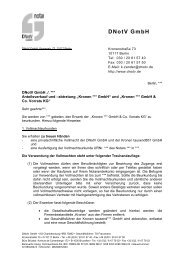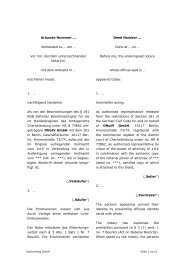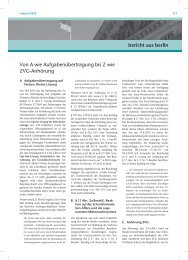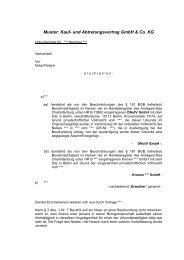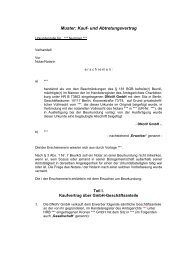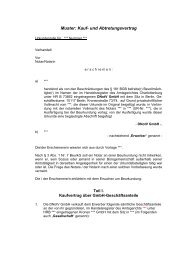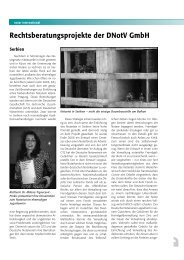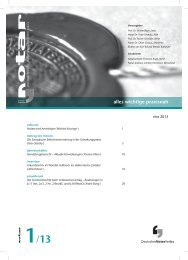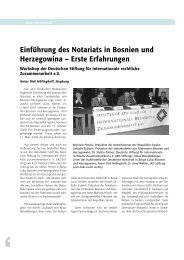notar Umbr_2.02 - Deutscher Notarverein
notar Umbr_2.02 - Deutscher Notarverein
notar Umbr_2.02 - Deutscher Notarverein
Sie wollen auch ein ePaper? Erhöhen Sie die Reichweite Ihrer Titel.
YUMPU macht aus Druck-PDFs automatisch weboptimierte ePaper, die Google liebt.
36<br />
<strong>notar</strong> europa<br />
It should be sufficient to present<br />
the convocation to the shareholders’<br />
meeting on a website, including the<br />
agenda and all necessary templates<br />
for application for attendance and for<br />
proxies.<br />
Moreover filling an electronic application<br />
form and emailing it to the<br />
Company would not only accelerate<br />
the whole procedure of application for<br />
attendance and drafting the attendance<br />
register considerably but also<br />
reduce the cost significantly because<br />
no bank fees can be charged any<br />
more. The attendance register could<br />
be drafted or at least prepared to a<br />
high degree by computer. Naturally, a<br />
prerequisite for any harmonisation of<br />
these procedures is a comparative<br />
study of how shareholders’ meetings<br />
are convened and how the attendance<br />
to shareholders’ meetings is regulated<br />
in the Member States. Yet we doubt<br />
that the website of the Company is the<br />
right place for providing all this information.<br />
In particular in case of a proxyfight,<br />
of shareholders’ chat rooms or of<br />
shareholders’ proposals which contradict<br />
the strategy of the board, the<br />
Company’s webmaster is in a severe<br />
conflict of interest. The danger of a<br />
breakdown of the system just in the<br />
right moment is only too obvious.<br />
Although it is highly probable that<br />
the market will satisfy the need for research<br />
of such shareholders’ information<br />
by developing special business<br />
models for that need (e.g. virtual news<br />
agencies), it remains difficult especially<br />
for the private investor to obtain the<br />
necessary information. In our opinion<br />
a <strong>notar</strong>y or a <strong>notar</strong>ies´ organisation as<br />
trustworthy third party could be entrusted<br />
with the task of providing a<br />
web server for the necessary forms. By<br />
international cooperation of the <strong>notar</strong>ies<br />
just one URL and just one unionwide<br />
data format could be offered to<br />
the capital market.<br />
Using IT technology a shareholders’<br />
meeting could be convened as follows:<br />
� On a web-server of a trustworthy<br />
third party (e.g. <strong>notar</strong>ies’ organisa-<br />
tion) every listed company has a<br />
website offering information on reporting,<br />
shareholders’ meeting,<br />
disclosure of price sensitive information<br />
and a chat room for its<br />
shareholders.<br />
� Every interested person may enlist<br />
there for submission of investors’<br />
information by push-email.<br />
� The company publishes the convention<br />
and the agenda on that<br />
website, together with forms for<br />
certificate of deposit, proxies and<br />
application for attendance. Automatically<br />
the enlisted investors become<br />
informed.<br />
� Shareholders who plan to attend to<br />
the shareholders’ meeting have<br />
their bank submit the certificate of<br />
deposit by means of secure electronic<br />
traffic and fill and submit the<br />
application form. The applicant receives<br />
an electronic confirmation.<br />
� Automatically the data of the applying<br />
shareholder are added to a<br />
database which is the register of<br />
persons who have applied for attendance.<br />
� Counter-motions are possible, too.<br />
After brief examination of their<br />
content they are communicated to<br />
the enlisted recipients. Of course<br />
time periods may be provided for<br />
the submission of counter-motions<br />
as well as for the application<br />
for attendance.<br />
� Proxies may be submitted by<br />
means of secure electronic traffic,<br />
too.<br />
� In the meeting itself, the shareholder<br />
or the proxy-holder is registered<br />
as attending.<br />
Providing a chat room for shareholders<br />
one should not disregard that<br />
communication between shareholders<br />
depends on their rights to inspect<br />
the complete shareholders’ register<br />
(in case of registered shares) or – at<br />
least – to search in the complete attendance<br />
register of the last shareholders’<br />
meeting, of course using the<br />
appropriate research software. These<br />
possibilities are indispensable for minority<br />
shareholders if certain proposals<br />
(e.g. special investigation) require<br />
a quorum. In Germany, these possibilities<br />
have been practically abolished<br />
recently, officially based on the argument<br />
of protection of data privacy, but<br />
in truth strongly lobbied by ”Germany,<br />
Inc.”. Access to shareholders’ data<br />
should be admitted, at least to the<br />
data of those shareholders who<br />
agreed to such disclosure.<br />
Minimum Rights<br />
to Ask Questions<br />
There should be minimum rights<br />
to ask questions for shareholders, but<br />
this information right should not be<br />
confined to the general meeting. A<br />
view on the German general meeting<br />
will explain our position:<br />
Since almost 100 years, the socalled<br />
”rapacious shareholders”, a<br />
term already used before the Second<br />
World War, are a major topic of the<br />
German discussion. Why did this problem<br />
arise and why did we not solve it<br />
within the last century?<br />
In Germany, the shareholders’<br />
rights are concentrated on the annual<br />
general meeting. There and only there,<br />
questions may be asked, answers may<br />
be given or denied. The mere assertion<br />
of a shareholder that a question<br />
was not or not completely answered<br />
may lead to a lawsuit of avoidance of<br />
a shareholders’ resolution. The lawsuit<br />
of avoidance usually impedes the registration<br />
of the resolution or its completion.<br />
If e.g. a company applies for<br />
the authorisation to issue convertible<br />
bonds for purposes of its further financing,<br />
the market won’t accept a<br />
bond which authorisation is avoided.<br />
As high this risk may be for the company<br />
as low it is for the plaintiff. Putting<br />
forward a counterclaim on damages is<br />
practically useless. In the end, by a<br />
court settlement, the plaintiff meets<br />
his goals: getting bought out by the defendant<br />
for a price which – applying<br />
common sense – would be considered<br />
as blackmail. As a result the Ger-



